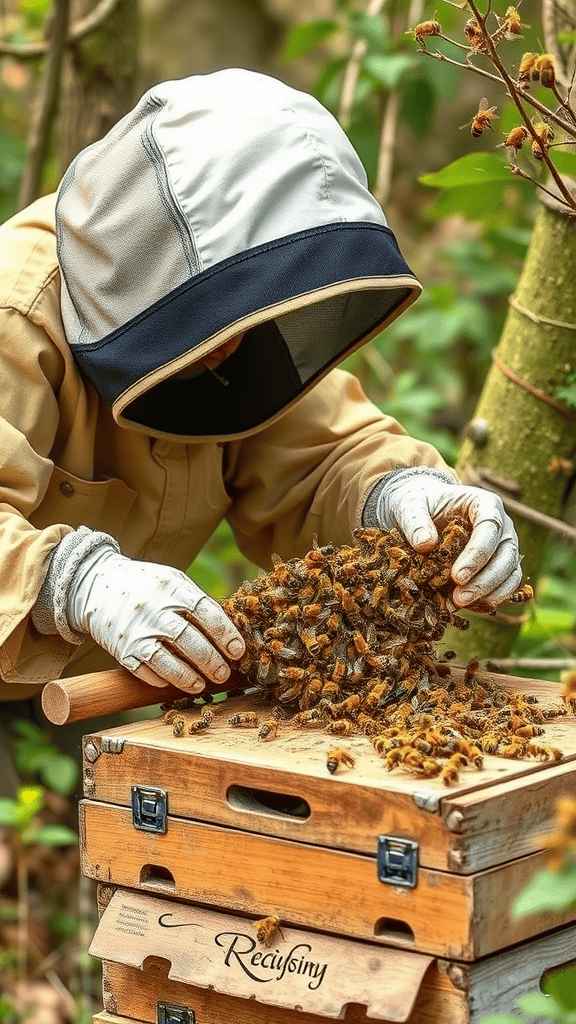Essential Steps for Starting Beekeeping in Pennsylvania
Starting beekeeping in Pennsylvania is an exciting venture that allows you to connect with nature while producing honey and supporting pollination in your community. Whether you are a hobbyist or aim to generate income, these essential steps will help you embark on your beekeeping journey successfully.
First, it’s important to know Pennsylvania’s regulations regarding beekeeping. The Pennsylvania Department of Agriculture offers resources and guidelines for new beekeepers. Understanding local laws regarding hive placement, registration, and inspections will set your foundation right.
Learn the Basics of Beekeeping
Before you purchase your first bees, educate yourself on the basics of beekeeping. Consider the following:
- Read books and articles on beekeeping foundations.
- Join local beekeeping clubs or associations in Pennsylvania.
- Take beekeeping classes or workshops.
These resources can provide practical knowledge and help you meet other beekeepers who can offer advice and support.
Select the Right Equipment
Your choice of equipment is critical for starting out. Essential gear includes:
- Beehive: Select a hive style, like Langstroth or top-bar hives. The Langstroth hive is popular for beginners due to its ease of use.
- Protective gear: Invest in a bee suit, gloves, and a veil to keep you safe while working with bees.
- Tools: Essential tools like a hive tool, smoker, and bee brush will help you manage your hives effectively.
Purchasing quality equipment may require an initial investment, but it pays off by ensuring the health of your bees and the safety of your beekeeping activities.
Choose Your Bee Species
You need to decide which type of bees to keep in Pennsylvania. The most common honeybee species include:
- Italian Bees: Known for their gentle nature and good honey production.
- Carnolian Bees: Resilient in colder climates, they tend to swarm less often.
- Russian Bees: Hardy and good at resisting diseases.
Each type has its advantages and disadvantages; choose based on your local climate and your experience with bees.
Find a Suitable Location
Bees thrive in a safe, sunny area that provides ample foraging opportunities. Consider these factors when selecting a location for your hives:
- Sunlight exposure, preferably morning sun, to help the bees warm up.
- Access to a water source nearby.
- Distance from high-traffic areas to reduce disturbance.
- Protection from extreme weather conditions, like high winds.
Ensure the hive placement is compliant with local ordinances regarding hive distance from property lines and other structures.
Start with One or Two Hives
As a beginner, it’s advisable to start with one or two hives. This allows you to learn and adapt without being overwhelmed. Monitor your hives closely to understand their behavior, check for health issues, and assess honey production.
Regular Maintenance and Inspection
Once your hives are established, regular maintenance is essential. You should:
- Inspect your hives every few weeks during the active seasons.
- Look for signs of diseases or pests, such as Varroa mites.
- Ensure your queen is healthy and the workers are active.
Keeping thorough records of your observations will help you make better management decisions as you gain experience.
Join the Beekeeping Community
Building a network with fellow beekeepers is beneficial. You can:
- Attend local beekeeping meetings and workshops.
- Participate in honey shows or community fairs.
- Use social media platforms or online forums to share experiences and seek advice.
The camaraderie and support you find in the beekeeping community will enhance your journey in beekeeping, especially as you encounter challenges.
Starting beekeeping in Pennsylvania requires preparation, commitment, and passion. By following these essential steps, you can enjoy the sweet rewards of beekeeping while contributing positively to the environment.
Common Challenges and Solutions for New Beekeepers in Pennsylvania
Starting beekeeping in Pennsylvania can be an exciting journey, but it doesn’t come without its challenges. New beekeepers often encounter various problems that can discourage them if they’re not well-prepared. Understanding these common challenges and their solutions can make a significant difference in your beekeeping success.
Weather Variability
Pennsylvania has a diverse climate that can be unpredictable. Cold winters and wet springs can affect bee activity. In spring, bees might emerge from winter too early, only to face leftover cold snaps, and throughout the summer, high heat can impact nectar flow.
- Solution: Be aware of local weather patterns and be flexible in your routines. Monitor temperatures and plan for protective measures, such as wrapping hives for winter or providing shade during hot spells.
Local Pests and Diseases
Pennsylvania is home to various pests like Varroa mites and small hive beetles, along with diseases such as American foulbrood. These threats can devastate a hive if not managed properly.
- Solution: Regular hive inspections are essential. Develop a routine to check for symptoms of disease or pest infestations. Utilize integrated pest management (IPM) techniques, such as chemical treatments or natural remedies, to combat issues without harming your bees.
Learning Curve
As a new beekeeper, the learning curve can be steep. There is a lot to know about bee behavior, hive management, and honey production. Many new beekeepers get overwhelmed by the information available.
- Solution: Start with local beekeeping classes or workshops. Joining a beekeeping club in Pennsylvania can also provide valuable hands-on experience. You can learn from seasoned beekeepers who have faced similar challenges.
Equipment Costs
Beekeeping comes with an initial financial investment for equipment like hives, protective gear, and tools. This can be daunting for beginners who are careful about spending.
- Solution: Start small with one or two hives. Purchase used equipment if possible, as it can significantly lower costs. Focus on essential items at first. You can gradually expand your apiary as you gain experience and confidence.
Time Commitment
Beekeeping requires a consistent time commitment for maintenance, hive inspections, and honey harvesting. Many new beekeepers underestimate the time involved, leading to neglect.
- Solution: Create a schedule that works for you and set aside dedicated time each week for your bees. Even brief, regular check-ins can be beneficial. This not only keeps you informed about your hives but reinforces your connection to your bees.
Honey Production Expectations
New beekeepers often expect high honey yields right away, but it usually takes time for hives to become productive. Patience is essential, as bees need time to build their colonies and find food sources.
- Solution: Manage your expectations. Focus on the overall health of your bees in the first year, rather than honey production. By establishing strong colonies, you’ll set yourself up for better yields in subsequent years.
Neighborhood Regulations
Not all neighborhoods in Pennsylvania may allow beekeeping, and each township can have its own set of rules and regulations. Failing to comply can lead to conflicts with neighbors.
- Solution: Before setting up your hive, check local regulations regarding beekeeping. Open communication with your neighbors can also create a cooperative atmosphere. Many residents appreciate the benefits of bees, such as pollination.
With these challenges and their solutions in mind, new beekeepers in Pennsylvania can better navigate the initial stages of beekeeping. Remember, every beekeeper faces struggles, and learning from them can lead to a rewarding experience. By focusing on education, community support, and patience, you can cultivate a successful beekeeping practice that contributes positively to the environment around you.
Conclusion
Starting your journey in beekeeping in Pennsylvania can be incredibly rewarding, offering not just a deep connection to nature but also the joy of producing honey and enhancing local ecosystems. By following essential steps such as researching local regulations, obtaining the necessary permits, and choosing the right equipment, you set a strong foundation for your beekeeping venture. It’s important to understand the unique climate and environmental conditions in Pennsylvania, as these factors greatly impact your bees’ health and productivity.
As a new beekeeper, you may encounter common challenges like pest management, hive diseases, and seasonal fluctuations. Embracing these challenges with proactive solutions can turn potential setbacks into learning opportunities. Utilizing local beekeeping associations and connecting with fellow beekeepers allows you to share knowledge and experiences, ensuring that you are always learning and adapting.
Remember, every beekeeper starts at the beginning, and patience is key. Creating a thriving apiary takes time and hands-on experience, but the rewards of watching your bees flourish are well worth the effort. Embrace the ups and downs, and don’t hesitate to seek help when needed. As you embark on this exciting journey, you’ll not only contribute positively to your surroundings but also develop a newfound appreciation for the indispensable role bees play in our ecosystem. Happy beekeeping, and may your hives thrive!
As an Amazon Associate, I earn from qualifying purchases.

